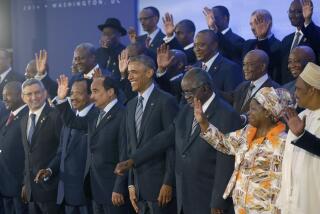Time for a New Spin on an Old Story : Mandela should project a South Africa poised to become a major world player.
- Share via
On one level, President Nelson Mandela’s triumphal sweep through Washington and New York last month was a much-deserved tribute to a truly heroic figure. But in terms of lasting substance, Americans and South Africans missed an opportunity to put the continent of Africa’s relationship with the West on a more productive, less obsequious basis.
For their part, Clinton Administration officials provided yet further evidence that, in foreign policy, they place absolutely no value on the true meaning of words. Their only concern is to please the audience of the moment, no matter if this means insulting its intelligence.
On this occasion, Vice President Al Gore was the villain. At a gala dinner in front of the Congressional Black Caucus, he told Mandela that South Africa represented a more important American national interest than Russia.
Now, of course, Gore and Mandela are sophisticated people. They both know that this is totally untrue. So perhaps the remark was simply an innocent subterfuge. But unfortunately, Mandela’s entire visit to the United States succumbed to this same virus of sincerely intended but essentially empty praise and promises. By adopting this approach, both sides slipped effortlessly into the sterile stereotypes that have characterized the West’s relations with Africa throughout decolonization.
U.S. officials praised Mandela as the savior of his people and promised aid, investment and joint bureaucratic commissions. Mandela stressed the economic depredations bequeathed by apartheid and sought aid for housing, sanitation projects and education.
This suits everyone. The United States, along with other Western nations, takes on the role of feel-good sugar daddy; South Africa assumes the familiar garb of African mendicant, doing the rounds of Western capitals, hand extended for charity.
In this way, the cycle of Western patron-client treatment of Africa has acquired a new lease on life. We seem to have learned nothing from the post-colonialism experience. Mandela is the last, not the first, African statesman to lead his country to independence--that was Ghana’s Kwame Nkrumah nearly 40 years ago. Since that time, events have taught some valuable and hard lessons about the West’s relationship with Africa, both about the ineffectiveness of aid as a development catalyst and about the humiliation that aid dependency brings.
How much better it would have been if Americans and South Africans could have torn up this tired script and started on something fresh.
From the American side, the main requirement is for honesty about aid. In a year when lack of funds to satisfy fire-code violations delayed the opening of Washington public schools, the idea that significant sums of American taxpayer money will be available for South Africa is preposterous. Whatever the promises--Mandela received assurances of $600 million over three years--it is a sure bet that delivery will be late, heavily conditioned and subject to arbitrary reduction at congressional whim. In short, it cannot be depended on for budgeting.
The second piece of American advice for Mandela should be that, while tours of Western capitals may bring gratifying accolades, his time would be better spent in China, Taiwan or Chile. These are countries that not only went without aid but actually overcame international hurdles to win their place in the economic sun. The hard-won secrets of their success are more relevant to Mandela’s dilemma than the West’s cheap benedictions.
For his part, Mandela needs to change tack. Rather than emphasizing South Africa’s need for social spending to support a vulnerable democracy, he should concentrate on the factors that endow South Africa with near First-World status: It is the richest country in sub-Saharan Africa; has an advanced educational, scientific and industrial base; possesses a modern financial and communications infrastructure, and so on.
In other words, he should project South Africa not as a country desperate for aid or where do-gooders can exorcise a guilty conscience--an image that puts serious investors to flight--but as a country ready to take its place as the African partner of Western and Asian capitals in the global marketplace. Not only will this approach transform South Africa’s relationship with the West, but the resultant financial flows will generate more funds for social spending in an hour than weeks of debasing supplication in the anterooms of the World Bank and IMF. Ask any citizen of Taipei, Shanghai or Santiago.
More to Read
Sign up for Essential California
The most important California stories and recommendations in your inbox every morning.
You may occasionally receive promotional content from the Los Angeles Times.













